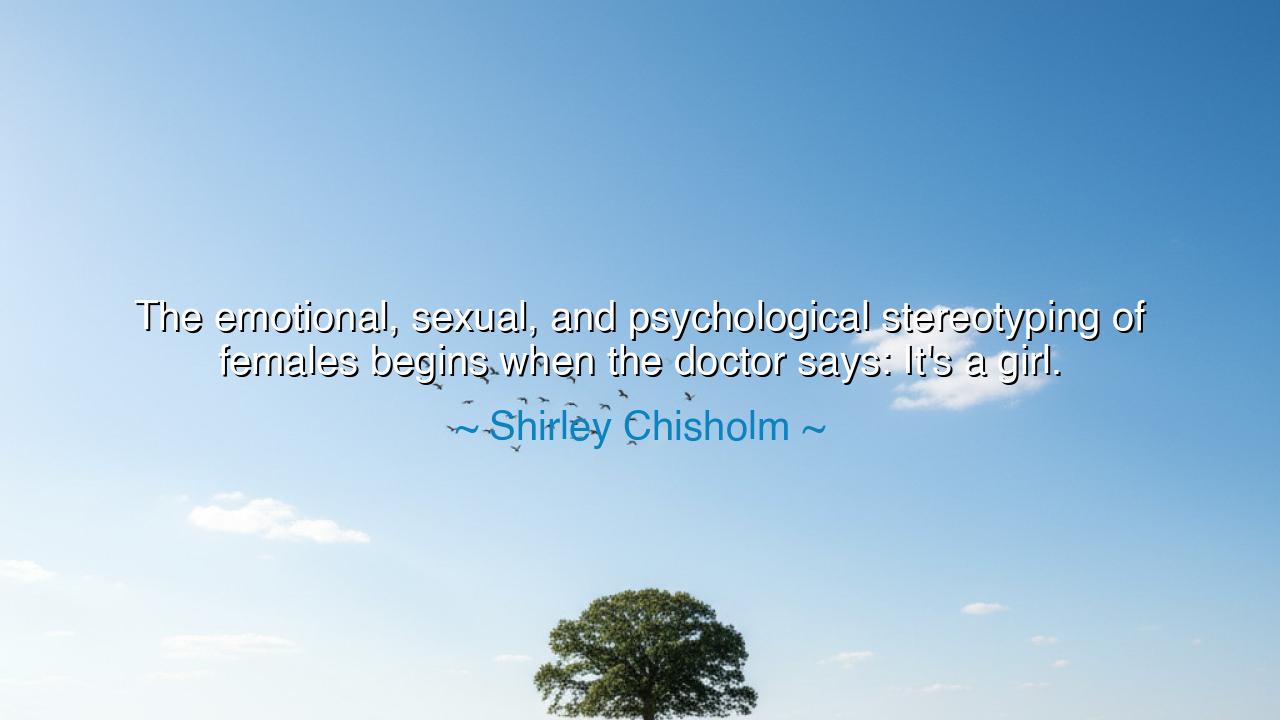
The emotional, sexual, and psychological stereotyping of females
The emotional, sexual, and psychological stereotyping of females begins when the doctor says: It's a girl.






“The emotional, sexual, and psychological stereotyping of females begins when the doctor says: It’s a girl.” Thus spoke Shirley Chisholm, the trailblazer of justice, courage, and truth—the first Black woman ever elected to the United States Congress, and a voice whose echo still rings through the halls of equality. In her words lies both lamentation and prophecy, a cry against the invisible chains that have bound women since birth. She reveals a profound truth: that inequality is not born in the field or the marketplace, but in the mind—and it begins the very moment a girl draws her first breath.
In the instant that a newborn is named and labeled, society’s expectations descend upon her like unseen veils. “It’s a girl,” the doctor declares—and with those words, the world begins to tell her who she is, who she can be, and who she cannot. The cradle becomes the first battleground of identity. She is taught softness before she can speak, gentleness before she can walk, and compliance before she can choose. Thus, Chisholm’s insight pierces to the heart of civilization’s oldest injustice: that the shaping of women’s lives begins long before they can shape their own.
Shirley Chisholm spoke from a life carved through walls meant to confine her. Born in Brooklyn to immigrant parents, she rose from modest beginnings to stand among the most powerful lawmakers of her time. Yet even in Congress, her every word was weighed not merely as a legislator’s, but as a woman’s, as a Black woman’s, as if her gender and race diminished her intellect or authority. Her quote, then, is not only about women—it is about the conditioning of a society that teaches limitation instead of possibility. She saw that the roots of inequality lie not just in laws or labor, but in the stories we tell our children—stories that whisper to the girl that she must be quiet, delicate, beautiful, and small, while telling the boy to be strong, bold, and free.
The ancients, too, understood the power of the word. For what is spoken at the beginning often shapes the course of a life. In many traditions, the act of naming carries sacred weight—it defines essence and destiny. So too does the phrase “It’s a girl,” spoken in the modern world, carry both wonder and warning. In some lands, it is met with joy; in others, with disappointment or fear. Even before she opens her eyes to the sun, the girl-child inherits the world’s expectations—its burdens of beauty, its rules of behavior, its cage of perception. Chisholm’s wisdom reminds us that oppression is not merely an external force; it is an inheritance passed silently, generation to generation, through custom, habit, and speech.
Consider the story of Malala Yousafzai, the young girl from Pakistan who defied the world’s decree that education was not for her kind. From childhood, she was told that her place was not in school, that her worth was less because she was female. Yet she rose—her voice breaking through centuries of silence—to proclaim the right of all girls to learn. She was shot for her defiance, yet she survived, and her words now travel farther than any bullet could. In her story, we see Chisholm’s truth made flesh: that the battle for equality begins not in adulthood, but in the moment of naming, and that freedom begins when a woman claims her own definition.
Chisholm’s declaration is not one of despair, but of awakening. For if society begins to shape its daughters at birth, then we must begin the work of liberation just as early. Let the first words spoken over a child not be prophecy of limitation, but of potential. Teach the girl not only to dream, but to believe that her dreams are possible. Teach the boy not to see her as weaker or lesser, but as his equal in thought, courage, and worth. For the cycle of stereotyping will only end when the next generation learns to speak differently—to call every child, regardless of gender, a bearer of boundless promise.
The lesson, then, is clear and sacred: change begins in perception. It begins in how we speak, how we teach, how we love. Parents, teachers, and leaders must guard their words, for every sentence shapes a soul. Do not say “You cannot,” but “You can.” Do not say “This is not for you,” but “The world is yours.” Remember that equality is not granted; it is nurtured—it must be cultivated from the very moment life begins.
So remember the wisdom of Shirley Chisholm, children of tomorrow: the fight for equality begins at birth, in the first breath, in the first words spoken over a child’s life. Let us, therefore, be midwives of justice, shaping a world where no one’s destiny is decided by gender, where no voice is silenced before it can speak. For when the doctor says, “It’s a girl,” let the world answer not with limitation, but with hope—for she, like every soul born upon this earth, carries within her the light of possibility, equal, eternal, and divine.






AAdministratorAdministrator
Welcome, honored guests. Please leave a comment, we will respond soon